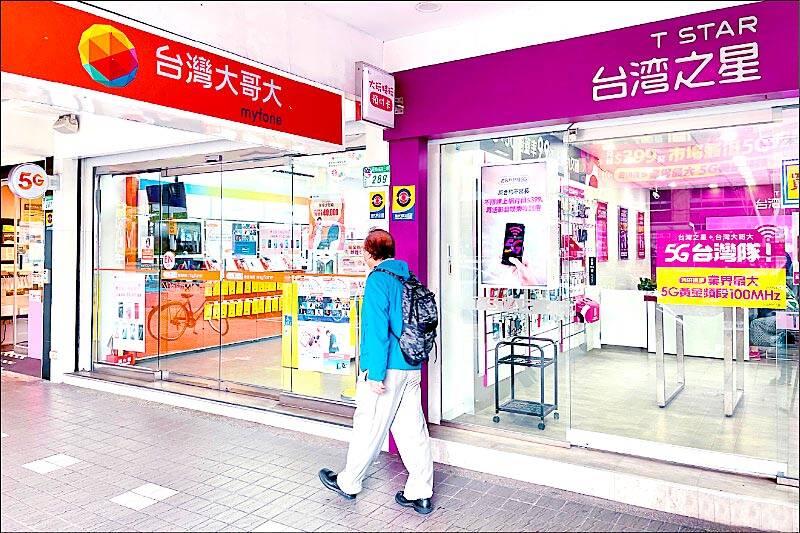Taiwan Star Telecom Corp (台灣之星) was yesterday fined NT$16 million (US$505,929) for failing to thoroughly verify the identities of subscribers and consequently allowing Chinese scammers to use mobile phone numbers to commit fraud, after it was fined NT$1 million for the same offense last week.
It was the highest accumulated fine that a telecom has received for a single offense in one day, NCC Vice Chairman Wong Po-tsung (翁柏宗) told a news conference yesterday.
The New Taipei City Prosecutors’ Office in January charged Luo Kai-chieh (羅楷傑) and two associates with contravening the Personal Data Protection Act (個人資料保護法).

Photo: Ting Yi, Taipei Times
Prosecutors said an investigation found that Luo and his associates had since September 2020 created 12 fake companies to apply for approximately 27,000 sets of mobile phone numbers from Taiwan Star that they resold to Chinese scammers for NT$1,300 each.
After the scammers secured the personal information of multiple Taiwanese nationals, they used the the mobile phone numbers to register on several popular e-commerce platforms, such as Shopee, prosecutors said.
The scammers used the platforms to sell contraband to unwitting buyers or engage in fake transactions with them, prosecutors said, adding that they also asked for donations for nonprofit organizations and then asked the victims to cancel their payments and wire the money to Shopee’s e-wallet instead.
The scammers then used the funds to purchase virtual currencies to cover their tracks, prosecutors said.
Although Shopee and telecoms have since May 2021 improved their verification systems for users, Luo and his associates set up a modem pool in a civilian’s home in New Taipei City’s Xinzhuang District (新莊區) to receive the verification codes from Shopee and other e-commerce platforms.
Records from Taiwanese customs showed that Luo applied to have Taiwan-made SIM cards exported to China 47 times.
Prosecutors have asked the court to consider a severe punishment for Luo and his associates as they conspired with Chinese scammers resulting in huge financial losses for Taiwanese citizens.
“After learning about the indictment in the news, we have also received leads for investigation from the New Taipei City and Kaohsiung prosecutors’ offices. Our investigation showed that a salesperson surnamed Tsai (蔡) in Taiwan Star’s corporate account department colluded with Luo by helping him obtain a large number of mobile phone numbers and bypassing the telecom’s identity verification and risk-control mechanisms,” Wong said.
“Taiwan Star has apparently lost administrative control over its employees and mobile phone numbers,” Wong said.
The commission yesterday deliberated over the offenses committed by eight of the 12 firms owned by Luo and his cohorts, he said.
“The telecom’s dealings with four of them showed major negligence on its part, and the commission ruled that it be fined NT$2.5 million for each case. For its dealings with the other four companies, the telecom was fined NT$1.5 million each. The telecom was fined a total of NT$16 million as per the Telecommunications Management Act (電信管理法),” Wong said.
The commission has yet to review four other cases where 3,010 Taiwan Star mobile phone numbers were exploited by scammers, he said.
Taiwan Star said that the commission’s ruling was unfair and it would appeal it.

A strong continental cold air mass is to bring pollutants to Taiwan from tomorrow, the Ministry of Environment said today, as it issued an “orange” air quality alert for most of the country. All of Taiwan except for Hualien and Taitung counties is to be under an “orange” air quality alert tomorrow, indicating air quality that is unhealthy for sensitive groups. In China, areas from Shandong to Shanghai have been enveloped in haze since Saturday, the ministry said in a news release. Yesterday, hourly concentrations of PM2.5 in these areas ranged from 65 to 160 micrograms per cubic meter (mg/m³), and pollutants were

Taiwan’s armed forces have established response protocols for a wide range of sudden contingencies, including the “Wan Chun Plan” to protect the head of state, the Ministry of Defense (MND) said today. After US President Donald Trump on Saturday launched a series of airstrikes in Venezuela and kidnapped Venezuelan President Nicolas Maduro, concerns have been raised as to whether China would launch a similar “decapitation strike” on Taiwan. The armed forces regularly coordinate with relevant agencies and practice drills to ensure preparedness for a wide range of scenarios, Vice Minister of National Defense Hsu Szu-chien (徐斯儉) told reporters before a

EVA Airways on Saturday said that it had suspended a pilot and opened an investigation after he allegedly lost his temper and punched the first officer several times as their plane was taxiing before takeoff at Los Angeles International Airport. According to a report published on Thursday by The Reporter, the incident occurred after the flight’s Malaysian first officer tried to warn the Taiwanese pilot, surnamed Wen (文), that he was taxiing faster than the speed limit of 30 knots (55.6kph). After alerting the pilot several times without response, the first officer manually applied the brakes in accordance with standard operating

Japanese Councilor Hei Seki (石平) on Wednesday said that he plans to visit Taiwan, saying that would “prove that Taiwan is an independent country and does not belong to China.” Seki, a member of the Japan Innovation Party, was born in Chengdu in China’s Sichuan Province and became a naturalized Japanese in 2007. He was elected to the House of Concilors last year. His views on the Chinese Communist Party (CCP) — espoused in a series of books on politics and history — prompted Beijing to sanction him, including barring Seki from traveling to China. Seki wrote on X that he intends